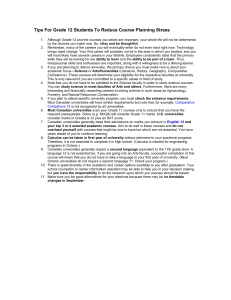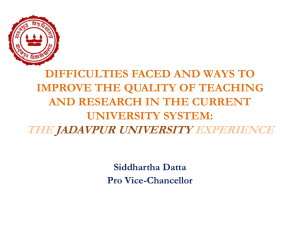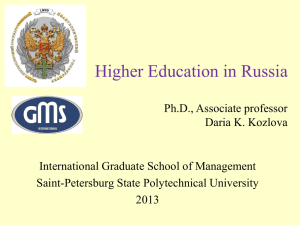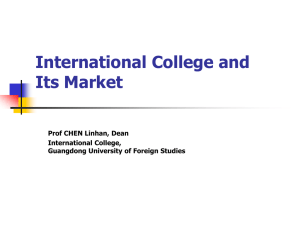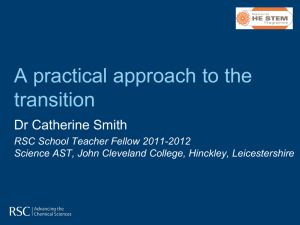AC Task Force on Academic Freedom
advertisement
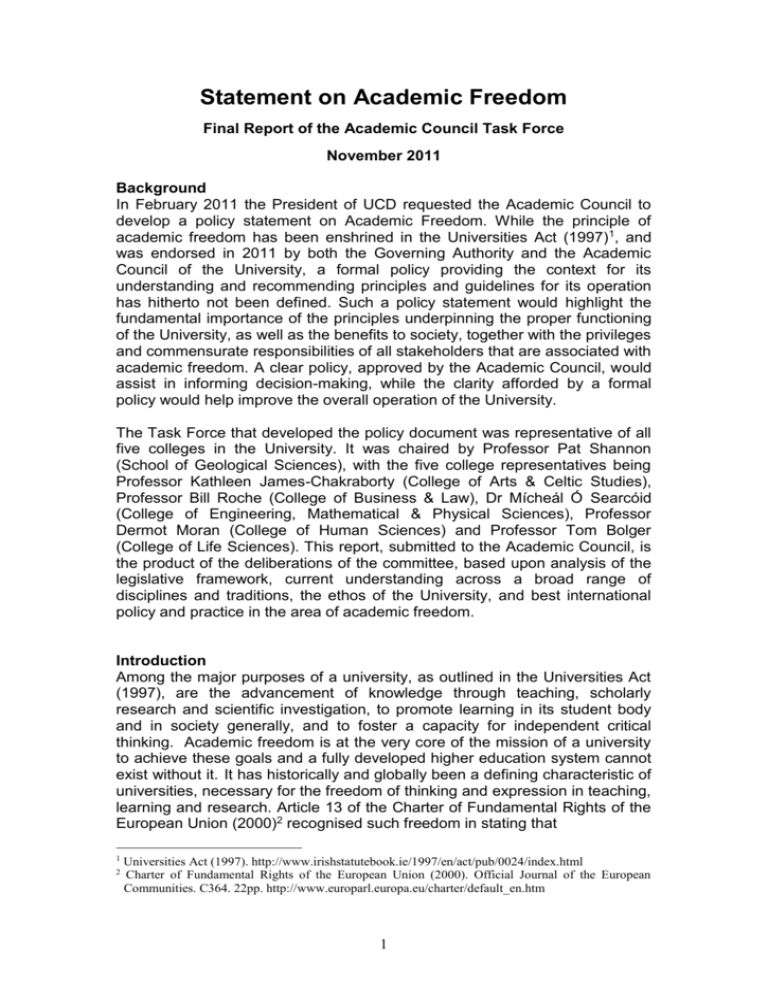
Statement on Academic Freedom Final Report of the Academic Council Task Force November 2011 Background In February 2011 the President of UCD requested the Academic Council to develop a policy statement on Academic Freedom. While the principle of academic freedom has been enshrined in the Universities Act (1997)1, and was endorsed in 2011 by both the Governing Authority and the Academic Council of the University, a formal policy providing the context for its understanding and recommending principles and guidelines for its operation has hitherto not been defined. Such a policy statement would highlight the fundamental importance of the principles underpinning the proper functioning of the University, as well as the benefits to society, together with the privileges and commensurate responsibilities of all stakeholders that are associated with academic freedom. A clear policy, approved by the Academic Council, would assist in informing decision-making, while the clarity afforded by a formal policy would help improve the overall operation of the University. The Task Force that developed the policy document was representative of all five colleges in the University. It was chaired by Professor Pat Shannon (School of Geological Sciences), with the five college representatives being Professor Kathleen James-Chakraborty (College of Arts & Celtic Studies), Professor Bill Roche (College of Business & Law), Dr Mícheál Ó Searcóid (College of Engineering, Mathematical & Physical Sciences), Professor Dermot Moran (College of Human Sciences) and Professor Tom Bolger (College of Life Sciences). This report, submitted to the Academic Council, is the product of the deliberations of the committee, based upon analysis of the legislative framework, current understanding across a broad range of disciplines and traditions, the ethos of the University, and best international policy and practice in the area of academic freedom. Introduction Among the major purposes of a university, as outlined in the Universities Act (1997), are the advancement of knowledge through teaching, scholarly research and scientific investigation, to promote learning in its student body and in society generally, and to foster a capacity for independent critical thinking. Academic freedom is at the very core of the mission of a university to achieve these goals and a fully developed higher education system cannot exist without it. It has historically and globally been a defining characteristic of universities, necessary for the freedom of thinking and expression in teaching, learning and research. Article 13 of the Charter of Fundamental Rights of the European Union (2000)2 recognised such freedom in stating that 1 2 Universities Act (1997). http://www.irishstatutebook.ie/1997/en/act/pub/0024/index.html Charter of Fundamental Rights of the European Union (2000). Official Journal of the European Communities. C364. 22pp. http://www.europarl.europa.eu/charter/default_en.htm 1 “The arts and scientific research shall be free of constraint. Academic freedom shall be respected”. Within Ireland, academic freedom was acknowledged in the Universities Act (1997) which stated that a university, in performing its function shall: “… have the right and responsibility to preserve the traditional principles of academic freedom in the conduct of its internal affairs”. The obligations of a university to safeguard this right are clear with the statement in the Act that “…if, in the interpretation of this Act, there is a doubt regarding the meaning of any provision, a construction that would promote that ethos and those traditions and principles shall be preferred to a construction that would not so promote”. At the level of the individual, the Act is specific in stating that “A member of the academic staff of a university shall have the freedom, within the law, in his or her teaching, research and any other activities either in or outside the university, to question and test received wisdom, to put forward new ideas and to state controversial or unpopular opinions and shall not be disadvantaged, or subject to less favourable treatment by the university, for the exercise of that freedom”. This freedom, within the law, to put forward new ideas and controversial or unpopular opinions was enshrined in Statute 6 (Chapter 1) of University College Dublin3. This statute (Chapter 6) also decrees that the control of the academic affairs of the University is subject to the traditional principles of academic freedom. These underlying principles of academic freedom are also echoed in the policy statements of many outstanding universities and groups of universities. The 1998 Policy Statement of the International Association of Universities (of which UCD is a member) on Academic Freedom, University Autonomy and Social Responsibility4 recalls the three indissociable principles for which every university should stand, namely: the right to pursue knowledge for its own sake and to follow wherever the search for truth may lead; the tolerance of divergent opinion and freedom from political interference; the obligation as social institutions to promote, through teaching and research, the principles of freedom and justice, of human dignity and solidarity, and to develop mutually material and moral aid on an international level. It defines the principles of academic freedom as the freedom for members of the academic community – scholars, teachers and students – to follow their scholarly activities within a framework determined by that community in respect of ethical rules and international standards, and without outside pressure. 3 Statutes of University College Dublin, The National University of Ireland, Dublin. http://www.ucd.ie/govauth/statutes.html 4 1998 Policy Statement of the International Association of Universities. Academic Freedom, University Autonomy and Social Responsibility. www.unesco.org/iau/he/af/index.html 2 The rights of academic freedom confer responsibilities on the University and upon each member of the academic profession, notably the obligation to strive for excellence, challenge received opinion, advance the frontiers of knowledge through research, and disseminate results through teaching and publication. These are articulated in documentations such as the IAU 1998 Policy Statement. Under UCD’s Statute 6 (Chapter 20) the responsibilities and broad duties of academics are outlined as follows: “Professors and Lecturers shall engage in research and scholarship, shall instruct students of the University and shall perform such other appropriate duties as their Head of School or Research Institute Director may reasonably assign to them. Professors and Lecturers shall serve on such committees and perform such administrative functions as the President may require”. Academic freedom cannot be an excuse for not carrying out the teaching, research and such administration duties as may reasonably be required for the efficient functioning of the University. Neither can it be used as a cloak for underperformance in these duties. Benefits to Society Although the benefits of a free press and open discussion of ideas are broadly recognised as being at the very heart of a modern democracy, the concept of academic freedom is equally central, although perhaps this is not as widely appreciated by the public. The general understanding is that it embodies the freedom, and indeed the responsibility, to question and test wisdom, and to put forward new opinions (including dissenting, controversial or unpopular views) based upon informed experience, research and consideration, without the fear of losing jobs, privileges or career prospects at educational institutions. Moreover, creative academic work, essential in order to advance knowledge, overcome prejudice, inform and benefit society in the present and for the future, takes time and experience to develop and hone; there is the presupposition that the academic has the appropriate time to complete the task. Society, the major sponsor of universities is also the major benefactor of the products of academic freedom. Its students are educated and taught to learn. Its industries receive the benefits of research. Its future depends on current basic research that provides both the structures from which new ideas will emerge and flourish, and the foundation on which undreamed-of technological advances will be conceived and realised. New technologies and spin-off industries arise from ideas developed under the freedom to innovate. These yield medical, pharmaceutical, technological, engineering, and numerous other products. Cultural aspects of society are enriched by the books, plays and multiple forms of artistic and literary expression and endeavours nurtured by universities. Powerful social, educational and political ideas are discovered that contribute to driving social change and to the development of public policy. The outputs of research, through publication and dissemination, increase knowledge and enhance the reputation of the individuals, the institution and ultimately the society that sponsors and provides the 3 environment and the freedom to complete the work of knowledge generation and dissemination. However, the purpose of a university is sometimes mistakenly seen as narrowly utilitarian, and thus as largely limited to providing technological skills and to stimulating industrial and cultural developments. Developing society’s skills in imaginative vision and critical thinking is one of the greatest benefits that a university can provide, and this is clearly linked to the protection afforded by academic freedom. Such critical thinking contributes to the shaping of government policy, and to informing public opinion on the development of a civilised society. Academic freedom conveys an obligation on academic staff to inform society through independent research, analysis and discourse. The lack of such independent analysis and the fear of sanctions for questioning decisions were referred to in the Nyberg Report (2011)5 on the banking crisis, which affirmed that “.. the reported lack of challenging discourse and analysis …, together with occasional mention of alleged or feared sanctions against contrarians… ” contributed to the problem. The receipt of well-grounded, independent advice, unshackled by fear or favour, on many areas critical to the survival, development and optimal functioning of society, is probably more important to Ireland now than at any time since the foundation of the State. The University and the State Universities in Ireland, as in most other European countries, are heavily reliant on state funding. Both academic staff and students should be aware of their dependence on the state, and increasingly on industry and other benefactors, to support them in their work. The receipt of such funding carries with it the duty of accountability for how it is deployed and for the results it achieves. However, such accountability does not encompass a right to control or dictate the manner in which the university conducts its core business of teaching and research nor should it curtail academic freedom. Only by autonomy to govern their own affairs can universities and academics protect an environment in which they are free to exercise their rights of freedom of speech and thought, and ultimately provide an independent voice on matters in which they are expert. For example, the standards of degrees can only be defended if recognised as purely academic matters in which the State does not enter. As argued by Russell (1993)6, if this principle is not accepted, universities should cease to exist as they will serve no purpose other than to ‘rubber stamp’ uninformed decisions reached by the State. This university/state symbiosis, in which each is dependent on and benefits from the other, will always involve a degree of tension regarding the value of the contribution of each party and the degree to which that contribution engenders obligations and entitles control. 5 6 Nyberg, P. (2011). Misjudging Risk: Causes of the Systemic Banking Crisis in Ireland. Report of the Commission of Investigation into the Banking Sector in Ireland. Government Publications. 156 pp. http://www.bankinginquiry.gov.ie/ Russell, C. (1993). Academic Freedom. Routledge, London & New York. 119 pp. 4 Current Sources of Threats to Academic Freedom The nature and operation of universities in Ireland has changed significantly within the past decade, both in response to changes in society and in the way the universities see their place in society. These changes have brought with them a set of new challenges and circumstances that could run into conflict with academic freedom. In setting the context for the description and discussion of key principles of Academic Freedom in the following sections, a few of these are outlined here. Perception of universities by outside bodies. There is a mistaken impression that the working time of a university academic can be measured entirely by the hours spent lecturing in the classroom. There is often no appreciation that the primary purpose of a university, determined in the Universities Act (1997), is the advancement of knowledge through research and its communication in teaching. Academics are primarily researchers, working in the classroom, the laboratory and the library, and collaborating with other universities, research institutions and industry. Academics are required by their contracts to engage in research and this has to be carried out along with lecturing, mentoring, and examining students, as well as supervising graduate students and directing research staff. They run research groups and laboratories, and spend significant time in preparing grant applications, and in writing and peer reviewing scholarly publications. They provide input to public policy and their output in some areas of research can lead to the development of patents or spin-out companies. Acknowledgement of the academic’s administrative duties within the University, or service to society and to the subject/discipline necessary to build and maintain international reputation for the University and the country, is also typically neglected in public discussions on the nature of academic life. The effect of such limitations is a negative perception on the part of outside bodies and of society in general, which risks the withdrawal of, or decrease in support for, the needs and maintenance of academic freedom and its responsibilities and benefits. Changes in university governance. Mistakes identified in the governance of financial and other institutions in Ireland have resulted in a greater awareness of the need for appropriate governance. They have highlighted the need to review and change, where appropriate, the methods of corporate governance in business and public institutions7. They have often pointed towards a method of governance comprising boards, governing authorities or councils involving smaller numbers of members predominantly from outside the organisation. Executive management teams are made clearly accountable to such institutions. This enables more accountable as well as swifter and more direct decision-making. Within a university, governance and management of this character may, however, hinder individual and collegiate input into direction and decision making, and may limit the university’s autonomy in deciding its teaching and research programmes. The academic freedom and 7 OECD. Corporate Governance and the Financial Crises: Key Findings and Main Messages. 2009. 58pp. http://www.oecd.org/dataoecd/3/10/43056196.pdf 5 responsibility to provide independent and rigorously researched information and opinion to society may also be inhibited. Resources and resource allocation. State funding of specific areas of teaching and research can serve as an attraction for staff working in these and cognate areas, both in terms of recruitment of academic, research staff and graduate students, as well as in infrastructure. However, allocation of resources can serve to penalise those areas that find it more difficult to attract nonexchequer funding or those areas where student numbers are unlikely to rise significantly for justifiable reasons. There is a significant danger that, if unchecked, resource allocation rather than free and well-founded academic enquiry will drive the direction and intensity of university research and teaching. Strategic planning and internal management systems. Such planning is vital for the operation of a modern university. However, some areas of teaching and research are unlikely to feature in the strategic objectives of the university and in the way in which such planning is implemented through internal management systems. This can result in exclusion from full participation in the university’s operation, with consequent negative impact upon the individual, the subject/discipline and the school. It also risks stifling academic curiosity to explore the unconventional. Great discoveries and inventions are rarely planned, either in universities or in businesses and cultural organisations. Measurements of performance. Key performance indicators (KPIs) are a feature of most schools, colleges and universities. There is continued debate as to the optimum performance metrics between and within subject areas. The choice and application of KPIs may influence the nature of research or teaching carried out. Inappropriate methods and metrics may distort the assessment of a work’s quality and inhibit true innovation. If they are not chosen correctly, with due appreciation of the need to support the diversity of teaching and research across the University, they may serve to limit the freedom to explore beyond the current research areas dictated by funding, or teaching areas and methods as determined by student numbers or perceived satisfaction levels. Fixed-term contracts. Most informed discussions of academic freedom acknowledge the necessity for tenure. However, fixed-term contracts are also commonly and appropriately used for project-related and post-doctoral appointments, which are an established part of the early career development system in many disciplines. Academic freedom applies to people appointed to all academic positions in the University. However, it is recognized that a trend towards the greater use of fixed-term contracts by universities as a hedge against financial uncertainty consigns academics to ongoing insecurity beyond early career, limits the benefits associated with research and inhibits the ethos of scholarly and rigorous research that is essential to a university. 6 Academic Freedom: Principles In order to achieve the optimum efficiency and effectiveness in the operation of a university, academics must have confidence in the governance and management of the institution to articulate and implement its strategy and to account for its use of public funds. University management must likewise have the confidence to trust the wisdom and collegial integrity of academic staff in the operation of the university. The relevant State agencies, acting on behalf of society, must also have confidence that the universities fulfil their responsibilities of accountability for funding received. Only by the operation of such three-way trust and belief can the full benefits to all of academic freedom be realised. Therefore, we should recognise a number of key principles of academic freedom. These are grounded within the legislation of the Universities Act (1997) and the policy statement of the International Association of Universities, and are broadly in line with similar principles adopted in other universities abroad8 and in Ireland9. They should underpin the application of university policy in a number the key areas that impinge on academic freedom. Three key principles that should serve to inform the Academic Council, together with other governance and management units in the University, regarding issues of academic freedom are as follows: 1. Freedom of Expression. Policies of the University should recognise that freedom of expression is a core value of university life that has served it well throughout its history. No policy should be adopted that would deliberately or inadvertently diminish or inhibit freedom of expression among members of the university – either staff or students. Staff and students should understand and be mindful of the obligations and responsibilities that are gifted through freedom of expression. 2. Teaching and Learning. The University, through its policies, should foster a teaching and learning environment that encourages the search for the truth, facilitates the exchange of informed opinion between teacher and student, and values diversity of opinion and critique articulated in a constructive manner. Diversity of opinion in all facets of teaching and learning, including teaching and learning styles, subject matter and learning outcomes, should be a natural consequence of academic freedom. Academics should not be required to present as valid what they believe, on the basis of experience and informed opinion, to be untrue or inaccurate. Students should be empowered to question that for which inadequate evidence is presented. Notwithstanding the facets of freedom articulated above, the teaching staff of the University should be expected to deliver a curriculum arrived at through collegial discussion at discipline, school, college or university level as appropriate. 8 1940 Statement of Principles on Academic Freedom and Tenure with 1970 Interpretive Comments. American Association of University Professors. http://www.aaup.org/AAUP/pubsres/policydocs/contents/1940statement.htm 9 Trinity College Dublin Policy on Academic Freedom. 2010. 10 pp. http://www.tcd.ie/about/policies/academic-freedom.php 7 3. Research and Dissemination. The University should ensure the maintenance of an environment, both intellectual and physical, that fosters the search for truth and excellence in research. Policies should facilitate individuals and groups in pursuit of their research goals and aspirations. Support for specific areas of research, such as those deemed key university strategic areas, should not be pursued in a manner that would actively disadvantage other types or areas of research. History has shown that many of the greatest research advances came as a result of a long period of dedicated research in areas that were not at the time deemed profitable, useful, desirable or important. However, the lack of funding or other opportunities in a particular area does not negate the obligation of all academic and research staff in the University to conduct research to the highest possible standard and to communicate the results in the most appropriate manner. Academic Freedom and University Responsibility It is well understood internationally that internal university management systems and processes can have a major bearing on academic freedom. These include, in particular, systems and processes commonly introduced in recent decades to allocate resources to priority areas, to promote performance and to manage accountability. The Universities’ Act (1997), Section 14, entitles the University to regulate its affairs and obliges it to do so by using its resources in an efficient and effective manner and subject to public accountability. The University is charged with regulating its affairs in accordance with its ethos of independence and the traditional principles of academic freedom. This means that the management systems and processes established by the University must be cognisant of the merits of the breadth of disciplines and subjects, especially smaller ones which are vulnerable when key staff retire, and must regulate its affairs must operate in a manner that preserves and promotes academic freedom. In addition to its legal obligations, UCD, like many other modern universities, has acquired multiple roles as agents of state- and industry-funded research and innovation, as a source of policy expertise and advice and as educators of students for a range of professional activities. Universities have responded to these new roles by instituting planning and resource allocation processes. They are also held accountable for their widening range of activities through external evaluation, often paralleled by internal assessment processes. Universities are increasingly expected to demonstrate the value which they contribute to communities, economies and students who fund them, and to show all their major stakeholder groups that the resources entrusted to them are being efficiently utilised. They have also acquired specific obligations under public policy initiatives, such as public service modernisation programmes and associated collective agreements, in areas like performance management and development and workload allocation. The multiple roles of the modern university and the external and internal processes of 8 accountability, planning, resource allocation and management that they bring with them must also be undertaken in a manner that preserves and encourages academic freedom. The University’s management policies and processes, whatever their provenance, must therefore be implemented in a manner that preserves and encourages the freedom of academic staff. This principle has significant implications in particular for the human resources policies and practices through which these various institutional obligations, roles and priorities interface with the teaching and research of academic staff, and with their career plans and aspirations. The preservation and encouragement of academic freedom requires a balance to be struck in the operation of these management processes between the obligations on the University and its constituent colleges, schools, subject areas and research programmes and the freedom of individual academic staff. University policies and management processes must be implemented so as to preserve and promote academic freedom, while also meeting the obligations of the University to be accountable and supporting its priorities in teaching, research and resource allocation. The University and its constituent colleges, schools and subject areas are obliged to ensure that duties are allocated in a fair and transparent manner. The administrative burden of teaching programmes and of general university governance must also be shared equitably and transparently. These objectives are best achieved on a collegiate basis within schools and their constituent subject areas. Subject to these obligations and the attendant requirement that core teaching modules and programmes are properly resourced, the process of allocating workloads should seek to accommodate and thereby benefit from the academic and research priorities of staff, where appropriate. It should be recognised that new teaching and research priorities constitute a normal part of university academic activity and represent a source of innovation and a driver of new knowledge acquisition by students and the community. Scope should exist, subject to core teaching being covered, to allow academic staff to seek and undertake new teaching and research opportunities. The allocation of workloads should not operate in such a way that staff are confined indefinitely to teaching particular modules, or that may infringe their freedom to undertake inquiry in new and evolving fields or to disseminate the knowledge gained through research and teaching. The operation of the performance management and development process seeks to encourage academic staff to set objectives and development priorities with respect to personal scholarship, teaching and university duties in the wider context of University, College and School plans and priorities. Such a process is intended to support the development of academic staff over the course of their evolving careers. It is important that the performance management and development process and allied processes be operated in such a way that the research, teaching and other development priorities of 9 individual staff be respected and supported, and specifically that they should not be operated in a manner that infringes academic freedom, or that seeks to constrain academic staff to respond only to institutional plans and priorities, without taking due regard of priorities that flow from individuals’ disciplines and the evolving research and knowledge base. The University has developed a promotion system based on the demonstrated attainment of benchmarks (up to Senior Lecturer level) and on international peer assessment (for Associate Professor and professorial appointments). The operation of the promotion system should pivot on the making of appointments on the basis of personal scholarly and teaching attainments and merit, as underscored by peer review, and on the basis of contribution to the University, academic field and the community. Staff who are following research programmes, or who are involved in delivering modules and programmes that may not be seen as reflecting institutional priorities, should not be put at any disadvantage in respect of promotion. Nor should staff who are engaged in testing wisdom or questioning received opinion, or who are involved in controversies arising therefrom, suffer any disadvantage in respect of opportunities for promotion. Summary 1. One of the major purposes of a university, outlined in the Universities Act (1997) is the advancement of knowledge. Academic freedom is essential for such advancement. It protects and nurtures the freedom of thinking and expression in teaching, learning and research that is at the very core mission of a university. It is a defining characteristic of universities both historically and globally. 2. Academic freedom is recognised in European law and is enshrined in national university legislation and in university statutes. The principle and ethos of academic freedom have been endorsed by both the Academic Council and Governing Authority of UCD. 3. Academic freedom carries with it obligations both within the academic institution and also to society. It cannot be used as a cloak for the underperformance of teaching, research or administrative duties. 4. Society is a major benefactor of university academic freedom through graduates, basic research, research output, technological advances, books, artistic endeavours, informed independent social and political critique, analysis and policy advice. 5. A number of threats to academic freedom exist, reflecting changes in the nature and operation of universities in the context of changing national and international environments. These threats require careful management to ensure that the ethos and societal benefits of academic freedom are not inhibited. 6. The three key principles regarding the management of academic freedom centre on (a) freedom of Expression, (b) freedom within Teaching and Learning and (c) freedom within Research and Dissemination. 7. A framework of the responsibilities associated with fostering academic freedom within the University is articulated. 10




